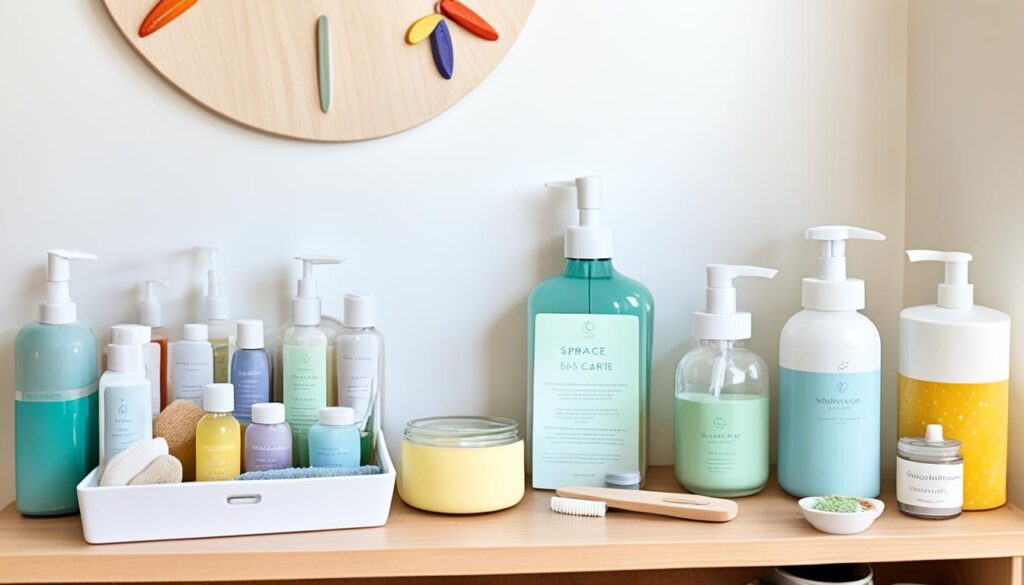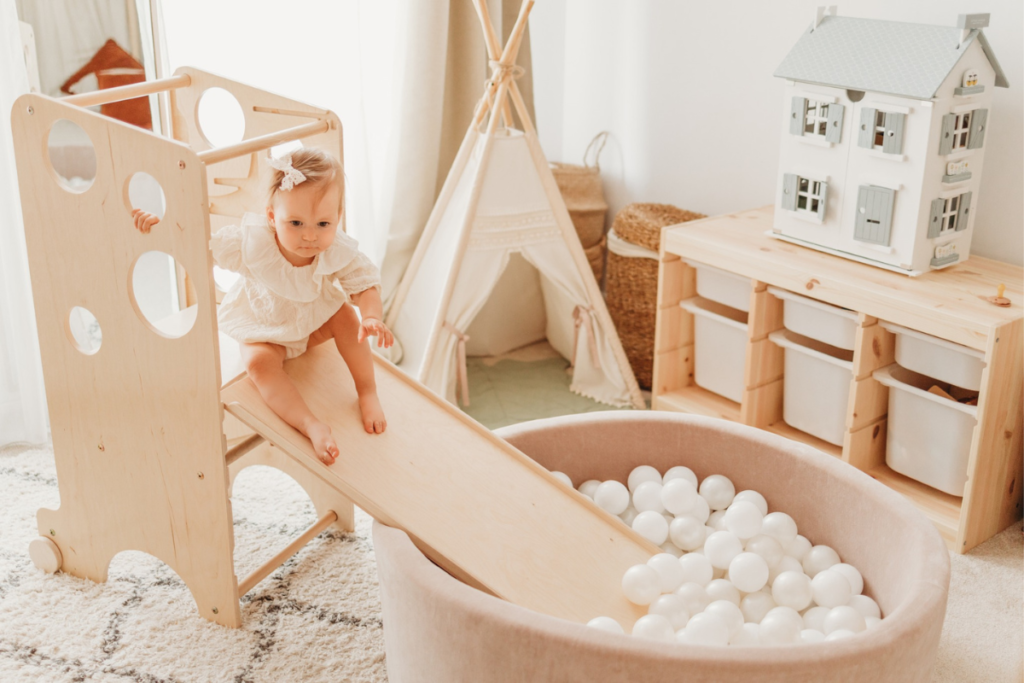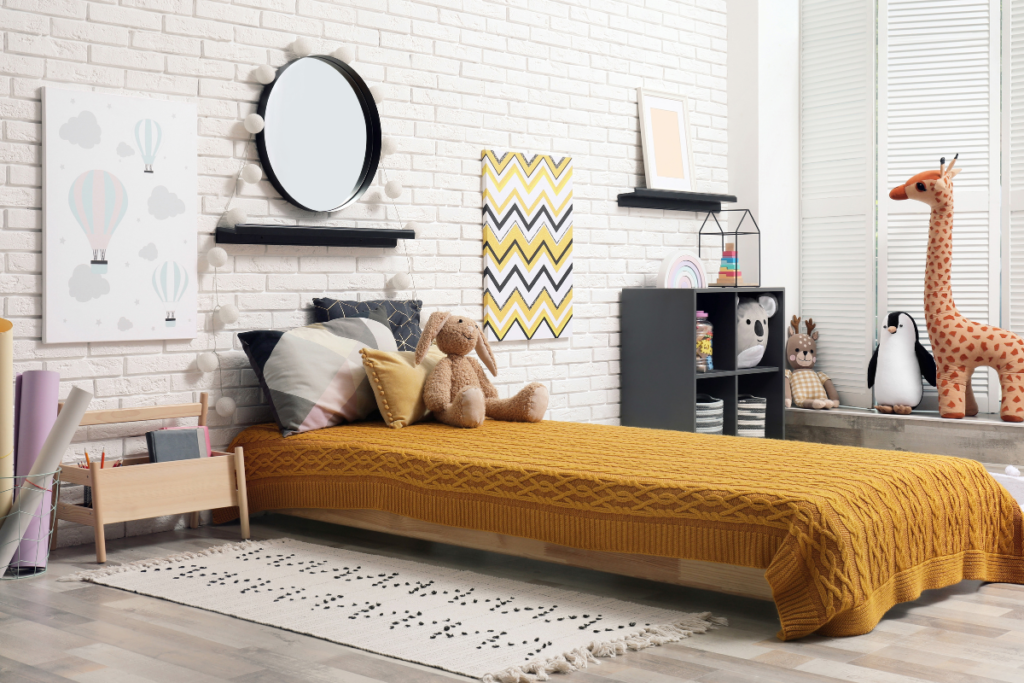Welcome to the world of Montessori self care, where children can learn to take charge of their own well-being and cultivate important life skills. By creating a Montessori self care station, you can provide a dedicated space for your child to engage in self-care activities independently. This hands-on approach nurtures independence, responsibility, and discipline, while fostering a love for learning and personal development.
Are you ready to dive into the world of Montessori self care for kids? In this article, we will explore ideas, tips, and resources to help you create a Montessori self care station at home. Whether you are a parent, caregiver, or educator, this guide will equip you with the tools you need to empower your child and inspire a positive self-care routine.
So, let’s get started on this exciting journey of Montessori self care ideas!
What is a Montessori Self Care Station?
A Montessori self care station is a designated area where children can engage in self-care activities independently. It provides a structured and supportive environment for children to learn and practice essential self-care skills. By creating a dedicated space, children can develop a sense of responsibility for their own well-being, fostering independence and confidence.
The self care station includes various materials and tools that cater to different self-care activities. These activities can range from simple tasks like hand-washing and teeth brushing to more complex activities like hair brushing and putting on shoes. The materials used in the station should be child-sized, accessible, and safe for the child to use, promoting a sense of ownership and encouraging active participation.
Whether it is set up in the bathroom, bedroom, or any other suitable area in the home, a Montessori self care station serves as a dedicated space for children to engage in these activities comfortably. This area provides a consistent and familiar environment where children can establish a self-care routine, gaining confidence in their abilities and developing lifelong healthy habits.
“The self care station empowers children to take charge of their own well-being, promoting independence and self-reliance. It provides a supportive environment for children to learn and practice essential self-care skills, fostering a sense of responsibility and ownership.”
By setting up a Montessori self care station at home, parents and caregivers can nurture their child’s independence and encourage the development of essential life skills. Let’s explore the benefits of a Montessori self care station in the next section.
Benefits of a Montessori Self Care Station
Setting up a Montessori self care station offers several benefits for children. By creating a dedicated space for self-care activities, you can empower your child to develop independence and self-reliance. Montessori self care resources play a crucial role in teaching children to take care of themselves and promoting a sense of responsibility and discipline as they engage in regular self-care routines.
A Montessori self care routine not only helps children establish healthy habits but also provides them with a consistent structure and routine, which is essential for their overall well-being. Having a designated area for self-care activities helps instill a sense of order and organization, allowing your child to take ownership of their daily self-care practices. It becomes a learning process that goes beyond basic hygiene.
The Montessori approach to self-care extends beyond the practical aspects. It also creates opportunities for sensory exploration and fine motor skill development. From pouring water into a bowl to brushing their teeth, each activity engages your child’s senses and strengthens their coordination and fine motor skills. This holistic approach to self-care ensures that your child’s physical, emotional, and cognitive needs are met.
Creating a Montessori self care station allows your child to experience the joy of independence while developing essential life skills. It’s empowering for them to learn that they are capable of taking care of their basic needs in a safe and supportive environment.
To further enhance your child’s self-care experience, you can incorporate montessori inspired self care activities that align with their individual interests and preferences. This customization not only keeps them engaged but also allows for a deeper connection with self-care practices.
Now, let’s explore some practical tips and ideas to help you create a Montessori self care station at home, ensuring that your child’s self-care journey is both enjoyable and educational.
Creating a Montessori Self Care Station at Home
Creating a Montessori self care station at home is a simple and rewarding process that empowers your child to take ownership of their self-care routine. By setting up a dedicated space with child-sized materials and ensuring easy accessibility, you can foster independence and instill healthy habits. Here are some tips and ideas to help you create a Montessori self care station in your home.
1. Choose a suitable location: Select a convenient and child-friendly area in your home, such as the bathroom or bedroom. This allows for privacy and easy access to essential self-care items.
2. Provide child-sized materials: Ensure that the materials and tools available in the self care station are appropriate for your child’s size and abilities. This includes child-sized toothbrushes, toothpaste, hairbrushes, and other necessary items. This encourages your child to independently use and care for their own belongings.
3. Consider step stools or low tables: To promote independent access to sinks, mirrors, and other items, consider using step stools or low tables. This allows your child to comfortably reach and use these items without assistance.
4. Organize with labeled containers and shelves: Create a visually appealing and organized self care station by using labeled containers and shelves. This helps your child find and return items to their designated places, promoting order and a sense of responsibility.
5. Introduce the self care station: Introduce your child to the self care station and explain its purpose. Show them how to use the materials and engage in self-care activities. Provide guidance and support as they learn and navigate their self-care routine.
6. Encourage independence: Encourage your child to take the lead in their self-care routine. Support their efforts and offer praise for their accomplishments. Promote independence by allowing them to make choices and take responsibility for their own well-being.
Essential Materials for a Montessori Self Care Station
A well-equipped Montessori self care station should include a variety of essential materials and resources to support your child’s self-care activities. These materials are specifically chosen to promote independence, engagement, and the development of self-care skills. By providing child-sized and accessible tools, you are empowering your child to take responsibility for their own hygiene and well-being.
Here are some essential materials that you can consider including in your Montessori self care station:
- Child-sized toothbrushes: Choose toothbrushes with soft bristles that are suitable for your child’s age. Encourage them to brush their teeth independently.
- Toothpaste: Opt for child-friendly toothpaste that is safe to swallow. Help your child learn the appropriate amount to use and how to effectively brush their teeth.
- Hairbrush: Provide a child-sized hairbrush or comb for your child to practice brushing their own hair. Encourage them to develop their fine motor skills and independence.
- Small towel: Place a small towel within reach for your child to use for drying their hands and face after washing. It’s important to promote good hygiene habits.
- Tissues: Have a box of tissues available for your child to use when needed. Teach them the proper way to blow their nose and dispose of used tissues.
- Hand soap: Choose a gentle and child-friendly hand soap that your child can use to wash their hands independently. Promote regular hand-washing to prevent the spread of germs.
- Other items for specific routines: Depending on your child’s self-care routine and needs, you may also include items such as a nail brush, cotton balls, or any other materials that are relevant to their personal care.
Remember to prioritize materials that are safe for your child to use and made from natural, non-toxic materials whenever possible. By providing them with the right tools and resources, you are fostering their independence and helping them develop lifelong self-care habits.
You can also refer to the image below to get an idea of how to set up your Montessori self care station:
Continue reading to discover how these materials can be incorporated into your child’s daily routine and how the Montessori self care station serves as a learning environment.
Incorporating Practical Life Skills into the Montessori Self Care Station
The Montessori self care station provides an ideal opportunity to incorporate practical life skills into your child’s daily routine. Practical life activities focus on developing essential skills such as independence, coordination, concentration, and order. By engaging in activities like hand-washing, teeth brushing, and hair brushing, your child not only learns essential self-care skills but also develops important life skills that will benefit them in various aspects of their lives.
Practical life activities promote the development of fine motor skills and hand-eye coordination, as well as encourage independence and responsibility. These skills are not only crucial for self-care but also lay the foundation for success in tasks and challenges your child may encounter in the future.
“The exercises of practical life are formative activities, a work of adaptation to the environment. Such adaptation to the environment and efficient functioning therein is the very essence of a useful education.”
Through practical life activities, your child learns to take care of themselves and their surroundings while developing a sense of order and discipline. This promotes a structured routine and instills healthy habits that contribute to their overall well-being.
Promoting Independence and Skill Development
The Montessori self care station allows your child to independently engage in self-care activities suited to their capabilities. By providing child-sized tools and materials, they can take ownership of their self-care routine. This promotes independence, builds confidence, and nurtures their sense of responsibility for their own well-being.
Additionally, practical life activities introduce your child to age-appropriate challenges that require problem-solving and decision-making. Through these activities, they develop critical thinking skills, learn how to organize their tasks and belongings, and gain a better understanding of cause and effect.
Integration with Montessori Philosophy
The incorporation of practical life skills into the Montessori self care station aligns perfectly with the Montessori philosophy. Maria Montessori believed that children’s education should encompass all aspects of life, including practical skills that facilitate their growth and development.
By engaging in self-care activities, your child not only learns to care for their physical well-being but also develops a sense of respect for themselves and their environment. They learn to appreciate the importance of taking care of themselves and their personal space, which contributes to their overall sense of responsibility and empathy towards others.
Your child’s engagement in practical life activities within the Montessori self care station fosters a love for learning and self-improvement. They develop essential life skills that will serve them well beyond their early years and establish a solid foundation for their future endeavors.
In the next section, we will explore age-appropriate Montessori self care activities that you can incorporate into your child’s routine.
Age-Appropriate Montessori Self Care Activities
When it comes to cultivating self-care skills in children, it’s essential to tailor the activities to their age and developmental stage. A Montessori self care station offers a range of age-appropriate tasks that can empower kids to take charge of their own well-being.
For younger children, emphasize foundational self-care habits such as washing hands and brushing teeth. These simple tasks can be introduced early on, helping them develop important hygiene practices. Encourage them to engage in these activities independently, offering guidance and support as needed.
As children grow older, they can take on more complex tasks that align with their increasing skill set. This may include activities like tying shoelaces, washing their face, and combing their hair. By gradually introducing these responsibilities, children develop a sense of competence and autonomy in their self-care routine.
All tasks should be approached with patience and an understanding of the child’s readiness. Allow them to take the lead in performing age-appropriate self-care activities while offering gentle guidance and support along the way.
Fostering Independence and Confidence
Engaging in age-appropriate self care activities not only fosters independence but also enhances children’s confidence in their abilities. By giving them the opportunity to accomplish tasks on their own, you are instilling a sense of self-reliance and empowerment.
Encourage children to make decisions about their self-care routine and take ownership of the tasks they are capable of performing. This not only builds their confidence but also reinforces the importance of personal well-being and a positive self-image.
“Empowering children to take care of themselves from an early age helps build a strong foundation for their overall development and independent living.”
– Dr. Maria Montessori
By integrating age-appropriate Montessori self care activities, you are nurturing their independence and fostering a positive mindset towards self-care. They will acquire the skills needed for maintaining a healthy lifestyle, setting them on a path of self-sufficiency and well-being.
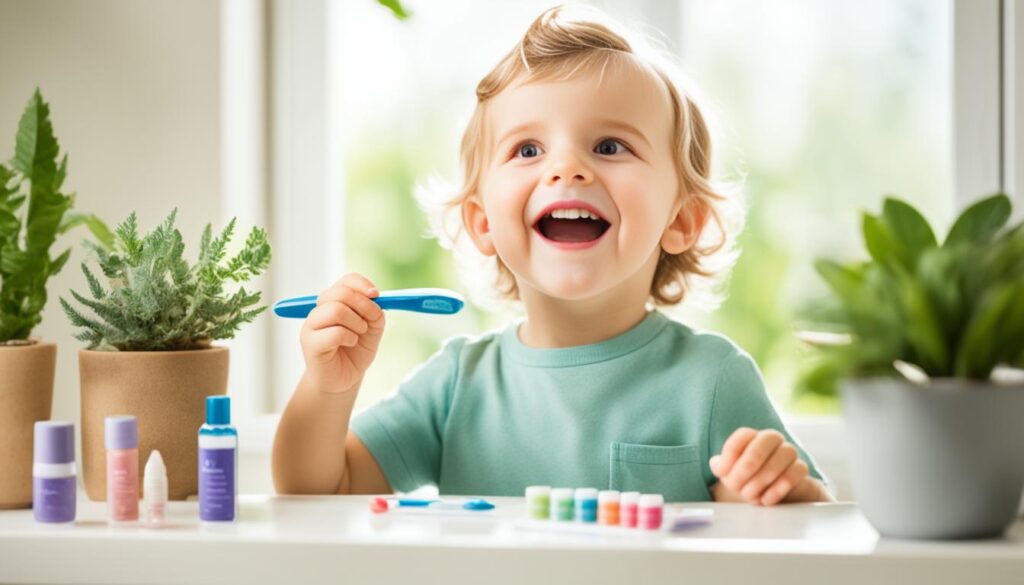
Nurturing Independence through Montessori Self Care
The Montessori self care station is a powerful tool for nurturing independence in children. By encouraging them to participate in self-care activities from an early age, you are empowering them to take ownership of their own well-being. This sense of responsibility and self-reliance builds their confidence and strengthens their self-esteem.
Through a Montessori self care routine, children learn valuable life skills while developing a positive self-image. They understand the importance of taking care of themselves and become more mindful of their own needs. This fosters a sense of independence and teaches them to prioritize their well-being.
By providing a dedicated space for self-care activities, you create a supportive environment where children can freely explore and engage in daily self-care tasks. This encourages them to develop a consistent self-care routine and establish healthy habits that will benefit them throughout their lives.
The Montessori approach to self-care emphasizes the child’s active participation and decision-making in their routine. It promotes independence by allowing children to choose and use child-sized materials and tools. This hands-on experience not only enhances their motor skills but also empowers them to make their own choices and take responsibility for their actions.
By nurturing independence through a Montessori self care routine, you are not only fostering important life skills but also instilling a sense of confidence and self-worth in your child. The ability to care for oneself is a valuable lifelong skill that empowers children to thrive.
Through the Montessori self care station, children learn to respect and care for themselves, enhancing their overall well-being and happiness. By providing a nurturing environment that encourages independence, you are supporting their development and helping them grow into responsible, capable individuals.
Key Tips for Nurturing Independence:
- Set up a designated space for self-care activities, with child-sized materials and tools.
- Encourage your child to participate in their self-care routine by offering choices and guidance.
- Promote a consistent self-care routine by establishing clear expectations and providing support.
- Reinforce positive behaviors and celebrate your child’s achievements in self-care.
- Encourage your child to take ownership of their self-care routine and praise their efforts in building independence.
Remember, nurturing independence through a Montessori self care routine is a gradual process. Be patient and supportive, allowing your child to learn and grow at their own pace. With your guidance and encouragement, they will develop essential life skills and a lifelong commitment to self-care.
Montessori Self Care Station as a Learning Environment
The Montessori self care station is not only a practical area for self-care activities but also a valuable learning environment for your child. It provides numerous opportunities for sensory exploration, fine motor skill development, and practical life education.
Through engaging in self-care tasks, children learn about hygiene, body awareness, and the importance of establishing self-care habits. They acquire valuable knowledge and skills that will benefit them throughout their lives.
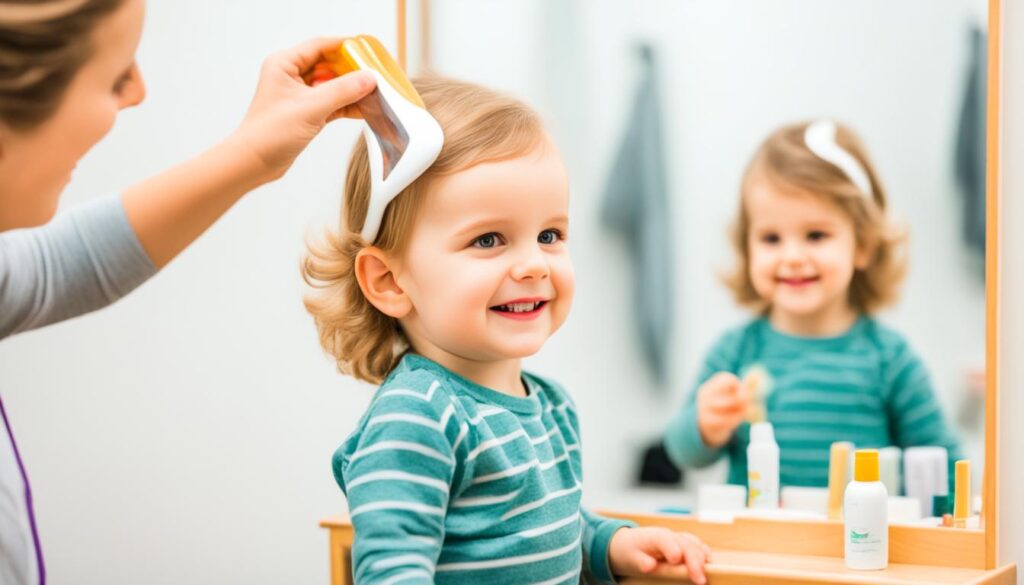
With the self-directed nature of the Montessori method, children have the freedom to explore and learn at their own pace. This fosters a love for learning and nurtures independence as they take charge of their self-care routine.
“The child is capable of developing and giving us tangible proof of the possibility of a better humanity. He has shown us the true process of construction of the human being. We have seen children totally change as they acquire a love for things and as their sense of order, discipline, and self-control develops within them… The child is both a hope and a promise for mankind.”
— Maria Montessori
By providing a designated space for self-care activities, you are creating an environment that encourages your child’s natural curiosity and desire for independence. As they engage in practical life tasks such as hand-washing, teeth brushing, and hair brushing, they develop important fine motor skills and hand-eye coordination.
Cultivating a Love for Learning
- Engaging in tactile activities like squeezing sponges, pouring water, and applying lotion stimulates the senses and promotes sensory exploration.
- The use of child-sized tools and materials encourages fine motor skill development, such as grasping and manipulating objects.
- Organizing and arranging materials in the self care station promotes order and helps children develop a sense of responsibility and discipline.
A Montessori self care station is not just about teaching children how to take care of themselves. It is a holistic learning experience that supports their overall development.
Continue reading to discover more about the importance of establishing a positive self-care routine with a Montessori self care station.
Encouraging a Positive Self-Care Routine with a Montessori Self Care Station
Establishing a positive self-care routine is essential for your child’s overall well-being. With a Montessori self care station, you can create and maintain such a routine effectively. By providing a dedicated space and materials for self-care activities, you can empower your child to engage in daily self-care tasks independently.
Consistency is key when developing a healthy self-care routine. Encourage your child to follow a regular schedule and reinforce the importance of self-care. By setting a positive example and incorporating self-care practices into your own routine, you can inspire and motivate your child to prioritize their well-being.
Allowing your child to take the lead in their self-care routine is crucial. Encourage them to make choices and decisions regarding their self-care activities, within appropriate boundaries. This will foster a sense of autonomy and ownership, empowering them to take responsibility for their well-being.
As your child engages in self-care tasks, provide support and guidance as needed. Offer praise and positive reinforcement to celebrate their efforts and accomplishments. This will help build their confidence and motivation to continue practicing self-care regularly.
Remember, a Montessori self care station is not just a physical space but also a nurturing environment for your child’s well-being. It serves as a reminder that self-care is important and should be prioritized. By incorporating Montessori principles into their self-care routine, you are instilling lasting habits that will benefit them throughout their lives.
“The first essential for the child’s development is concentration. The child who concentrates is immensely happy.” – Maria Montessori
Creating a positive self-care routine through a Montessori self care station allows your child to experience the joy of taking care of themselves. It promotes independence, self-confidence, and a positive self-image. By establishing healthy habits early on, you lay the foundation for a lifetime of self-care and well-being.
Foster Independence with Montessori Self Care Activities
Encouraging independence is a fundamental aspect of the Montessori approach to self-care. With a Montessori self care station, your child can develop essential skills and habits that empower them to care for themselves confidently.
The self-directed nature of Montessori self care activities allows your child to learn at their own pace and explore their abilities. As they engage in tasks such as brushing their teeth, washing their hands, and getting dressed, they develop coordination, concentration, and a sense of mastery over their own bodies.
By providing accessible and child-sized materials, you promote a sense of ownership and responsibility. Your child can easily access the items they need and take charge of their self-care routine. These activities also facilitate the development of fine motor skills and hand-eye coordination, further enhancing your child’s overall growth and development.
Creating a positive self-care routine with a Montessori self care station is a gift you can give to your child. By nurturing their independence, you empower them to take control of their well-being and develop lifelong habits that prioritize self-care and self-love. So, set up a Montessori self care station in your home today and watch your child thrive!
Additional Resources:
- Montessori Self Care: Montessori Dad
- Montessori Self Care at Home: The Montessori Home
Conclusion
Creating a Montessori self care station at home is a wonderful way to empower your child and foster independence. By providing a dedicated space with child-sized materials and resources, you can help your child develop valuable self-care skills and habits. A Montessori self care station not only promotes independence but also enhances your child’s learning experience through sensory exploration and practical life education.
Encourage your child to take ownership of their self-care routine by involving them in setting up the station and organizing the materials. This will help them develop a sense of responsibility and discipline. As they engage in self-care activities independently, they will gain confidence, strengthen their self-esteem, and cultivate a positive self-image.
With a Montessori-inspired approach to self-care, your child can enjoy the benefits of a structured routine while learning important life skills. Allow them to explore and learn at their own pace, providing guidance and support along the way. By creating a nurturing environment for self-care, you are setting the foundation for your child’s holistic well-being.
FAQ
What is a Montessori Self Care Station?
A Montessori self care station is a designated area where children can engage in self-care activities independently. It includes various materials and tools that support children in learning and practicing self-care skills. This can include activities such as hand-washing, teeth brushing, hair brushing, and putting on shoes. The materials used should be child-sized, accessible, and safe for the child to use. These stations can be set up in the bathroom, bedroom, or any other suitable area in the home.
What are the benefits of a Montessori Self Care Station?
Setting up a Montessori self care station offers several benefits for children. It promotes independence and self-reliance as children learn to take care of themselves. It also fosters a sense of responsibility and discipline as they engage in regular self-care routines. Having a dedicated space for self-care activities helps to establish a consistent routine and instill healthy habits. Additionally, a Montessori self care station provides opportunities for sensory exploration and fine motor skill development.
How can I create a Montessori Self Care Station at home?
Creating a Montessori self care station at home is a relatively simple process. First, choose a suitable location such as the bathroom or bedroom. Ensure that the materials and tools are child-sized and easily accessible for the child. Consider using step stools or low tables to allow for independent access to sinks, mirrors, and other necessary items. Organize the station with labeled containers and shelves to promote order and encourage the child to take ownership of their self-care routine. Finally, introduce the child to the station and provide guidance and support as they learn to use the materials and engage in self-care activities.
What materials should I include in a Montessori Self Care Station?
A well-equipped Montessori self care station should include essential materials and resources to support the child’s self-care activities. These can include child-sized toothbrushes, toothpaste, a hairbrush, a small towel, tissues, hand soap, and any other items necessary for the child’s specific self-care routine. It’s important to choose materials that are safe for the child to use and made from natural, non-toxic materials whenever possible.
How do I incorporate practical life skills into the Montessori Self Care Station?
The Montessori self care station provides an ideal opportunity to incorporate practical life skills into the child’s daily routine. Practical life activities focus on developing independence, coordination, concentration, and order. By engaging in activities such as hand-washing, teeth brushing, and hair brushing, children not only learn self-care skills but also develop important life skills that will benefit them in various aspects of their lives. These activities also promote the development of fine motor skills and hand-eye coordination.
What are some age-appropriate Montessori Self Care activities?
The activities included in a Montessori self care station should be age-appropriate and match the child’s developmental stage. For younger children, simple tasks like washing hands and brushing teeth can be introduced, while older children can take on more complex tasks such as tying shoelaces or washing their face. It’s important to observe the child’s readiness and provide appropriate guidance and support as they learn and master each skill.
How does a Montessori Self Care Station nurture independence?
The Montessori self care station serves as a valuable tool for nurturing independence in children. By allowing children to participate in self-care activities from an early age, they develop a sense of ownership and responsibility for their own well-being. This empowers them to become more self-reliant and confident in their abilities. Encouraging independence through a Montessori self care routine also helps to strengthen the child’s self-esteem and promotes a positive self-image.
How does a Montessori Self Care Station function as a learning environment?
The Montessori self care station not only serves as a practical area for self-care activities, but also as a rich learning environment. It provides children with opportunities for sensory exploration, fine motor skill development, and practical life education. Through engaging in self-care tasks, children learn about hygiene, body awareness, and self-care habits. The self-directed nature of the Montessori method allows children to explore and learn at their own pace, fostering a love for learning and independence.
How can I encourage a positive self-care routine with a Montessori Self Care Station?
Establishing a positive self-care routine is essential for children’s overall well-being. A Montessori self care station can help in creating and maintaining such a routine. By providing a dedicated space and materials for self-care activities, parents and caregivers can encourage children to engage in daily self-care tasks independently. Consistency and positive reinforcement are key in developing a healthy self-care routine. It’s important to allow the child to take the lead while providing support and guidance as needed.
How can I empower my child with a Montessori Self Care Station?
Creating a Montessori self care station at home is a wonderful way to empower children and foster independence. By providing a dedicated space with child-sized materials and resources, children can develop valuable self-care skills and habits. A Montessori self care station not only promotes independence, but also enhances the child’s learning experience through sensory exploration and practical life education. Encourage your child to take ownership of their self-care routine and enjoy the benefits of a Montessori-inspired approach to self-care.

